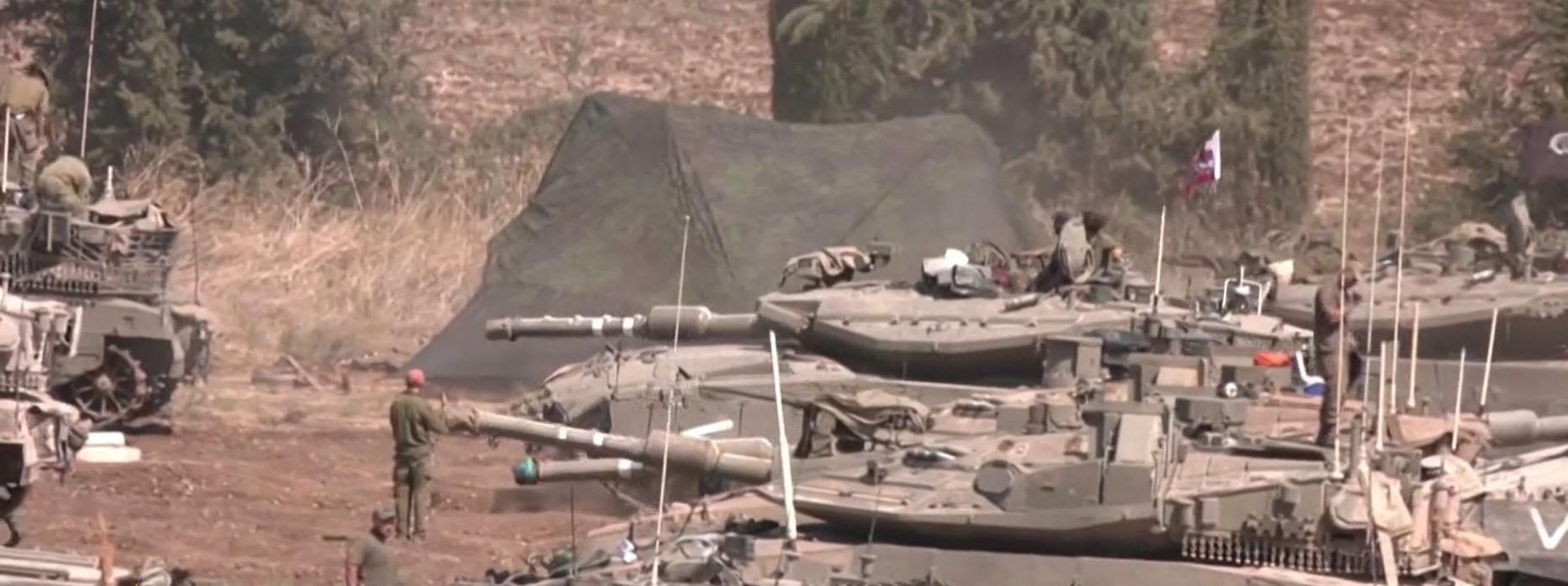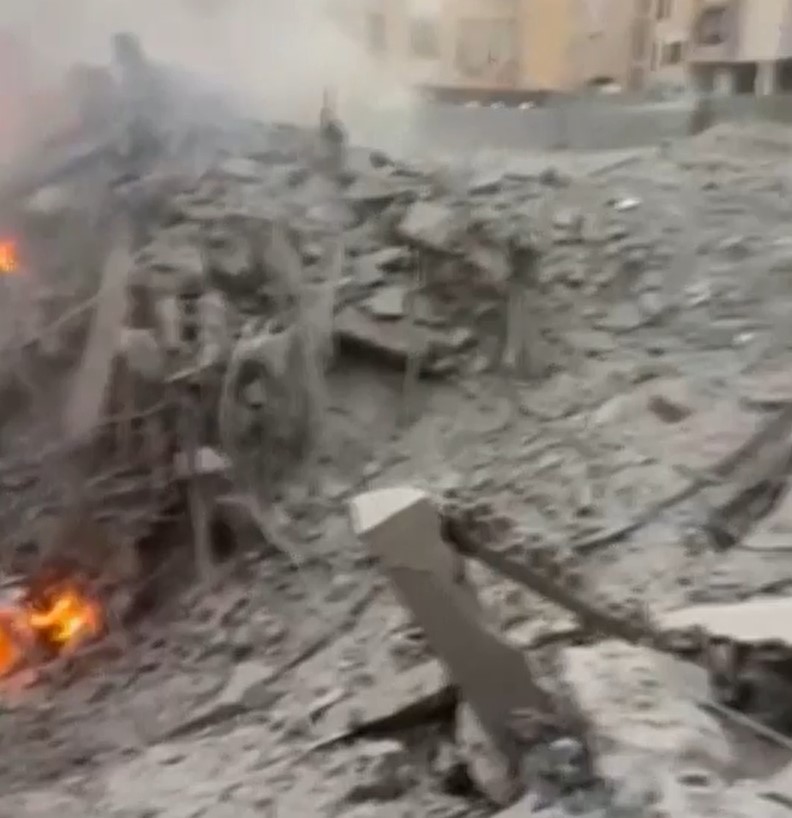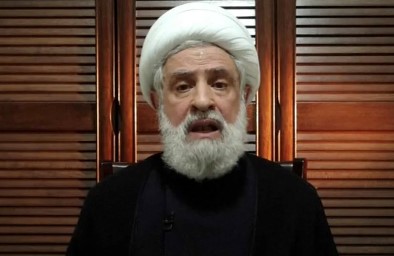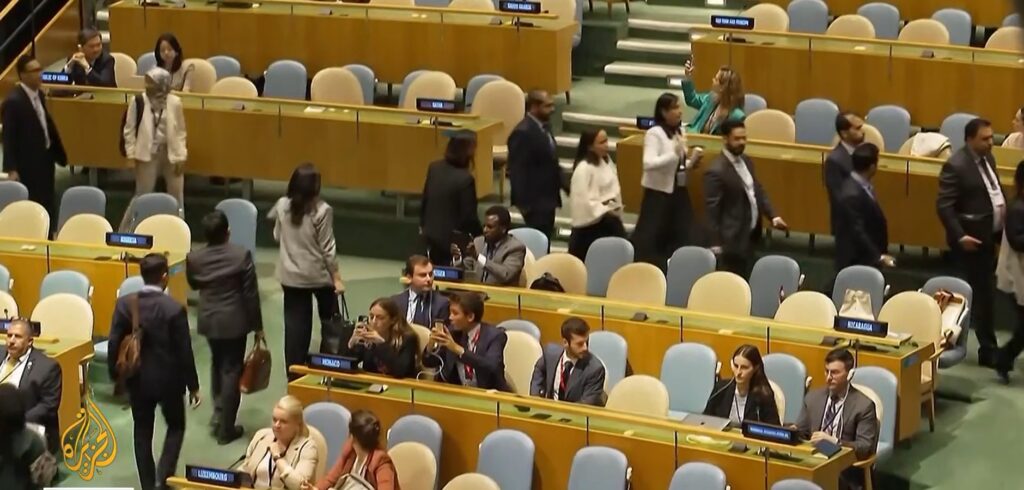
Netanyahu’s mistake in Gaza will be repeated in Lebanon
By John Pickard
Benjamin Netanyahu is going to make the same mistake in Lebanon that he has made in Gaza and the West Bank. He imagines that a brutal military offensive alone can eradicate a political movement and its basic ideas, when they are firmly rooted in the local population.
Israel is a military super-power in Middle East terms – with a huge army and air-force provided by Western powers, particularly the USA. But even in camparison to much more populous countries, like the UK or France, it has a far greater number of military aircraft, and more tanks and other hardware.
The Israeli airforce is thought to have used ground-penetrating bombs to kill the leader of Hezbollah in Beirut on Friday, demolishing half a dozen residental blocks in the process. As well as Hassan Nasrallah, it looks like Israel wiped out a large part of the Hezbollah leadership. As we can see from these assassinations and the large-scale attack on Hezbollah militants using sabotaged walkie-talkies two weeks ago, Israel also has a sophisticated surveillance network only bettered by the USA, China and Russia.
But what will Israel’s attack on Hezbollah lead to? Israel has used tens of thousands of tons of bombs to render most of the Gaza Strip uninhabitable. In the process, over 42,000 people have been killed, mostly women and children.
Israel bombing and killing at will
The bombing and killing still goes on, Israel killing at will. A huge humanitarian disaster has been created. In such a tiny area of land, Israel’s murderous bombing campaign, which is still ongoing, compares with the worst carpet-bombing of the Second World War.
Graphic of Israeli military support from USA
A large-scale conflict now also looks likely in south Lebanon, and when it does erupt, Israel’s huge military preponderance will guarantee that it can inflict massive casualities on a weakened Hezbollah, and, as it has done in Gaza, on thousands of non-combatants.
The Israeli government – whatever might be its official position – has no scruples about mass civilian casualties, and it has already killed over 1,000 in Lebanon. Netanyahu has shown that if need be, he will kill scores of civilians, as ‘collateral’ damage, just to assassinate one individual.
But an overwhelming Israeli military is not the end of the matter. In Gaza, even were Israel to succeed in completely eliminating Hamas as a fighting organisation – and that is still questionable – it will in the process have recruited tens of thousands more Palestinian youth to any future Hamas-like organisation.
Having assassinated most of the leadership of Hezbollah and put large numbers of members out of action, Netanyahu might imagine that he will destroy Hezbollah as a fighting force and as a movement. But, like in Gaza, that is making a serious mistake.
Hezbollah’s military capability degraded
We know from its genocidal destruction and killing in Gaza that bombardment is something the Israeli military does well. But it remains to be seen how much the same kind of bombing campaign in Beirut and southern Lebanon will have degraded the military capabilities of Hezbollah, which were, in any case, considerably greater than those of Hamas, and dispersed over a far wider area.

Even with its leading echelons decimated, Hezbollah has issued defiant messages on social media and it retains a considerable force. More to the point, whatever military damage is inflicted on Hezbollah, Israel will not eliminate the support for Hezbollah among Lebanese Shiites.
Lebanon has long been a patchwork of ethnic and religious groups. It is an artificial state, carved out of the former French ‘protectorate’ of Greater Syria, itself an artificial creation, based the agreement with British imperialism after the First World War. Lebanon was a state set up as a religious patch-work, to represent French imperial interests and to forestall Arab nationalist movements.
The main religious and ethnic groups in Lebanon: Maronite Christians, Sunni Muslims, Shia Muslims and Druze, all came to have their own political movements and the political system functioned corruptly, with spoils and patronage shared out between each of the main groups. The largest religious group, however, the Shia Muslims, living largely in the South and in the Bekaa Valley to the East, were the least well represented in the sectarian share-out.
That was the case until civil war erupted in the mid-1970s and it was the Shiite Amal militia that arose which to some extent corrected the imbalance, established a stronger position for Shiites and subsequently, an uneasy peace. Hezbollah is the successor to Amal, except that, like Hamas in Gaza, it established a large network of support, based on popular welfare and support programmes.
Through its close affiliation with Iran and its support for Assad’s regime in the civil war in Syria, Hezbollah has come to be the most powerful ‘non-state’ military force in the world, far bigger, for example, than the Lebanese state army itself. This is the force, including as many as ten thousand troops hardened by bloody fighting in Syria, against which Israel is now about to conduct a ground offensive.
It should also be noted that there is not widespread support among Sunni Muslims in Lebanon, not least for having conducted what was perceived to be a sectarian, anti-Sunni strategy in its role in support of Assad in Syria. There were no doubt many Sunni Muslims, in Syrian and Lebanon, who would have been celebrating Nasrallah’s death on Friday.
For Netanyahu, the destruction of Hezbollah is a necessity
It is difficult to say what is likely to happen. Even with the decimation of its leadership, Hezbollah still has a strong fighting capability. Most of its missiles have still not been destroyed and it has an extensive defensive network, including tunnels, across southern Lebanon. Even with a battered and almost destroyed leadership, Hezbollah will not be the push-over Netanyahu expects, if – or rather ‘when’ – Israel sends troops and tanks into Lebanon.
Netanyahu is bound on the path of war in Lebanon, because for him the destruction of Hezbollah is a necessary precondition for Israeli evacuees to return to the north, and that is now a key aim of Israel’s war.

Hezbollah has declared its support for the Palestinians of Gaza, but up to now it has only conducted a limited programme of missile launches against Israel, not wanting to provoke a massive israeli response. But if a massive Israeli assault is happening anyway, there is no longer a reason to hold back. Israel’s formidable defence systems have so far been able to destroy most Hezbollah missiles, but a massive ‘swarm’ attack could theoretically cause damage and high casualties in Israel.
It seems likely, therefore, that when Israel begins its ground offensive against Hezbollah, it will be fraught with problems. Historically, it has been military adventures in Lebanon that have produced the highest numbers of Israeli army casualties. Hezbollah is the only force to have fought the IDF to a standstill, when Israel went into southern Lebanon in 2006.
Brutal military triumphalism will not win ‘peace’ for Israelis
So when an invasion of Lebanon happens, it will be a bloody affair. Israel will have learnt from 2006, and it will deploy air power with devastating effect. But across a far bigger area than Gaza and against a far stronger opponent, the damage it can do from the air will be more limited.
Whatever happens now, the scenario for ordinary workers in Lebanon looks grim. Adding to those already forced to flee the fighting, nearly a quarter of a million Lebanese have fled from the south, half of them to Syria.
Incredibly, politicians in israel think that their brutal military triumphalism is somehow a road to ‘peace’. They may feel they have the right to bomb Gaza to rubble and do the same to parts of Lebanon. But they will be disabused of that idea. A bloody war with Hezbollah will cost Israel much more in soldiers’ deaths than Gaza has so far, and there may be civilian deaths from Hezbollah missiles.
Relentless militarism, war, aggression and repression
In the short term, Netanyahu will no doubt regain some domestic popularity, as is always the case in the heat of war. His entire political strategy is based on staying in office through belligerance and military strength. He has extended the Gaza war into Lebanon and far to the south, into Yemen. It is impossible to see how wide the conflict will become.
But longer term, his strategy will turn sour. Israel is a pariah state, on the point of being condemned for genocide by the International Court of Justice, reviled by workers and youth across the world for its treatment of Palestinians.

Even ordinary Israelis must come to understand at some point that there can be no peace, security or respite from international condemnation. Not, at any rate, on the road of relentless militarism, war, aggression, and the repression of Palestinian rights.
It is a grim and sober scenario we see in Lebanon. Ultimately, as always, it will be ordinary workers, men women and children, and non-combatants who will suffer immeasurably by the conflict.
As socialists, we should not only condemn the Israeli political establishment which for decades has pushed Israel towards apartheid. We should also look to those Western politicians who have supported Israeli every step of the way. These politicians, including some in the Labour Party, are little more than mouthpieces for the Israeli state – “my country right or wrong” – and they bear a heavy burden of responsibility for the regional war that is now developing.
All pictures are from the Al Jazeera, including theprogramme Inside Story, which discussed the likely outcome of the assassination of Nasrallah, and which can be seen here.
No comments:
Post a Comment